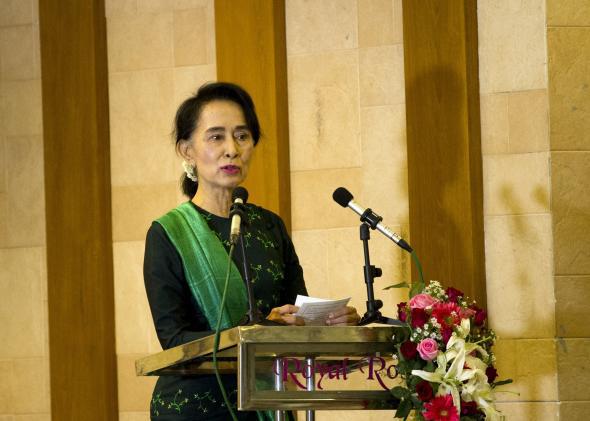Aung San Suu Kyi’s National League for Democracy is expected to take a large number of parliamentary seats in Myanmar’s general elections this fall, making it the most credible political threat to the country’s oppressive, military-backed government. No matter what the margin of victory for her party, however, Suu Kyi herself will likely remain ineligible for the presidency. Reuters reports that the country’s parliament failed Thursday to advance proposals for constitutional reform, leaving in place restrictions that prevent Suu Kyi from running:
The ballot followed a three-day joint session to debate changes to the army-drafted constitution and votes to amend the two key clauses fell short of the more than three-quarters support needed to put them to public referendum.
The military holds a quarter of unelected legislative seats in what amounts to veto power on changes to the constitution.
The motions sought to trim the share of house support required to amend the charter to 70 percent and to change criteria barring presidential candidates with children or a spouse holding foreign citizenship.
The popular Nobel laureate Suu Kyi cannot become president because her two children are British, as was her late husband.
The BBC reports that 388 members of the country’s parliament voted in favor of the changes, which required support from 498 members to be offered to the electorate for approval.
Aung San Suu Kyi’s NLD party won 80 percent of seats in parliament in a general election 25 years ago, leading the military junta of the country then known as Burma to discard the results and place Suu Kyi under house arrest. She was occasionally released from confinement over the next two decades until she was finally set free in November 2010.
Suu Kyi’s release came after a military-backed party defeated the NLD to win control of the parliament in the 2010 general election, a result that was met with widespread allegations of fraud. The ostensibly civilian government sworn in in 2011 has made some modest concessions, such as the release of political prisoners, but the military’s resistance to the proposed constitutional reforms is a sign that little has changed in the overall political climate.
Suu Kyi, 70, is sometimes referred to with the title “Daw,” meaning “Aunt,” and remains a popular figure in Myanmar in spite of military authorities’ efforts to limit her influence. She was awarded the Nobel Peace Prize in 1991.
